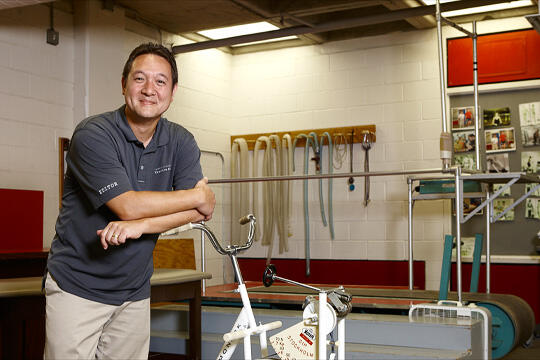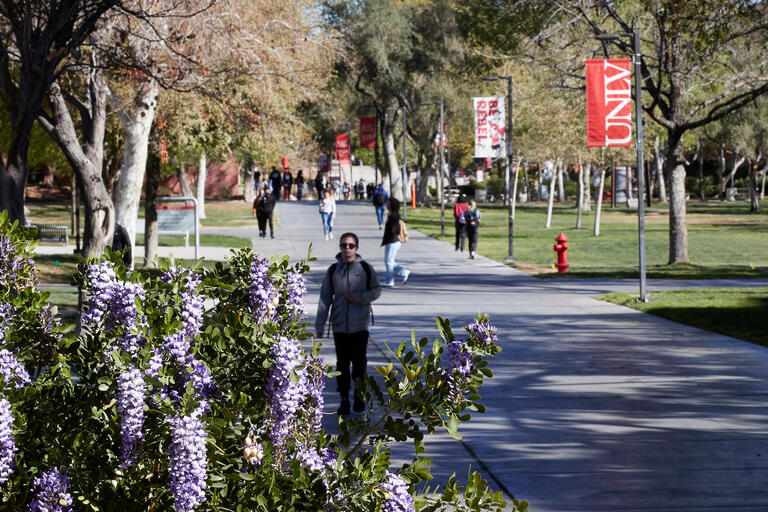James Navalta
Professor of Kinesiology
School of Allied Health Sciences
James Navalta blames his parents. They failed to provide their young avid athlete with one key to stardom: Olympic-caliber genes. Fortunately, he managed to marry his passion for sports with his interest in science.
After teaching nine years at Southern Arkansas and Western Kentucky universities, the kinesiologist has returned to his alma mater to work alongside faculty who helped launch his own career.
Why UNLV? I am a proud alumnus of UNLV ('98 MS Kinesiology), and am grateful for the education I received here. It really set me up for success in a doctoral program (at Purdue University) and in my professional career. Plus, a really great friend from the master's program, Dr. Tony Santo, is on the faculty here in the department, so being able to work alongside him every day was very appealing.
What do you find as the most interesting thing about your field? As a relatively new scientific field, there are many exciting areas that need to be explored in the realm of exercise physiology. We are constantly pushing the limits of human physiology and trying to explain the changes that occur is fascinating.
What is the biggest misconception about your field? We are an outgrowth from the field of physical education. There is a misconception that all we do is play games and that the discipline is easy. This is not the case for Physical Education or for Exercise Physiology. In the case of Exercise Physiology, it is very much a research-based discipline grounded in continued scientific discovery.
What has surprised you about your field? I have been surprised by the growth of the field internationally. We tend to live in a United States bubble, thinking that all of the most significant contributions come from our country. Through my work with the International Journal of Exercise Science, I have been surprised by the quality of work coming from countries outside the US.
What inspired you to get into your field? I played sports growing up and really enjoyed the atmosphere. When my professional athletic career did not materialize (basically because I was not good enough at anything. I blame my parents; they didn't have any Olympic-caliber genes to pass on), I looked to stay in a career in the area. My father is a small college volleyball coach, and having my career ride on the performance of 20-something-year-old athletes was not that appealing. I attended an American College of Sports Medicine conference as an undergraduate, and the scientific aspects of exercise really sparked an interest.
What is your research field? I study how exercise causes changes in your immune system. Your immune system is charged with helping to ensure that you do not get sick through the effects of foreign invaders (common cold, viruses, bacteria, etc.), and a main group of immune cells are lymphocytes these are white blood cells). I look at the changes in lymphocyte numbers in your blood as you exercise, and try to explain why this is happening.
What kind of professor would you like your students to remember you as? I hope that my students can look back and realize that I took an interest in each one as an individual. I hope that my students can't wait to come to class, and that they attend because they are excited about the subject (rather than from a sense of obligation because they are paying for the class).
What is your proudest moment? All of my proudest moments are centered around my family (wedding day and the birth of my children). From a professional standpoint, I am the most proud of my involvement with the International Journal of Exercise Science. It is a student-focused journal that aims to give future professionals peer-review experiences early on in their careers. Watching these students develop into really strong professionals has been very satisfying.
What would people be surprised to know about you? That I don't eat all that healthy. People assume because I am an exercise physiologist and that I train for mini-marathons, that I eat right. Maybe it's the Hawaiian in me, but I love some good food.
What can't you work without? Time. I need a good block of time to feel that I've accomplished anything.
Favorite gadget? I'm pretty low-tech -- I have a cell phone that is just a phone, if you can imagine. I used to have an iPhone, but don't have coverage anymore and use it to play music now and then. I haven't worn a watch in five years. Maybe I just haven't found the perfect gadget for me yet...
If you could fix one thing in the world what would it be? Inequality in pay between professions and also among countries. While professional athletes and movie stars do provide entertainment, I don't think their impact is greater than the elementary school teachers instructing my children. I believe that there are professions that have a profound impact, but do not pay particularly well and it would be nice to level the playing field. While we're at it, it would be nice to level the financial balance between countries -- might have less conflict that way.
One tip to succeed? Keep trying. I've found that success in my life has come because I kept at something, rather than being brilliant or particularly gifted. To succeed, you have to keep at it.
Who is your hero? Any man or woman who is a good parent to their children. They have a lasting impact in making the world a better place, and I look up to such individuals.



